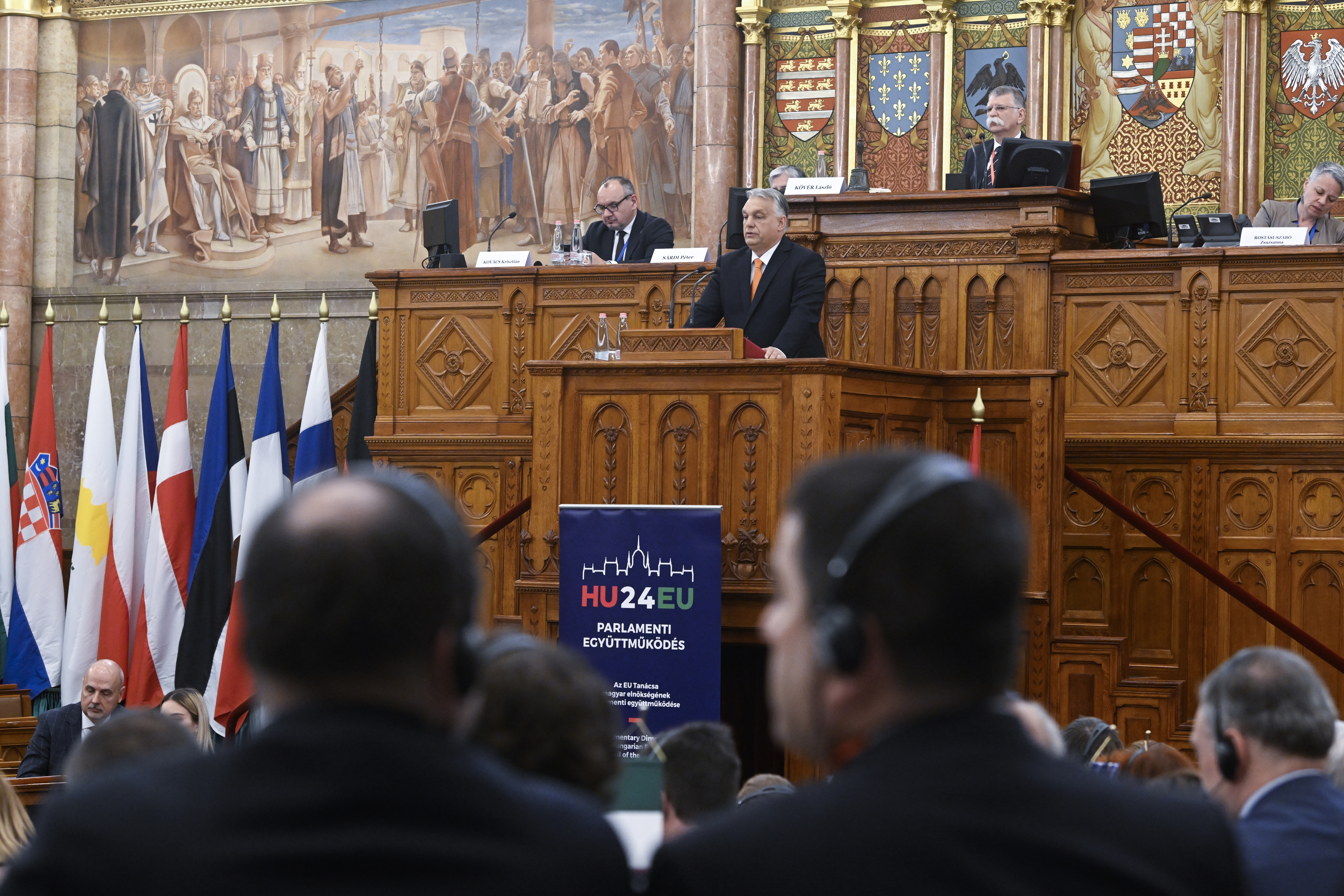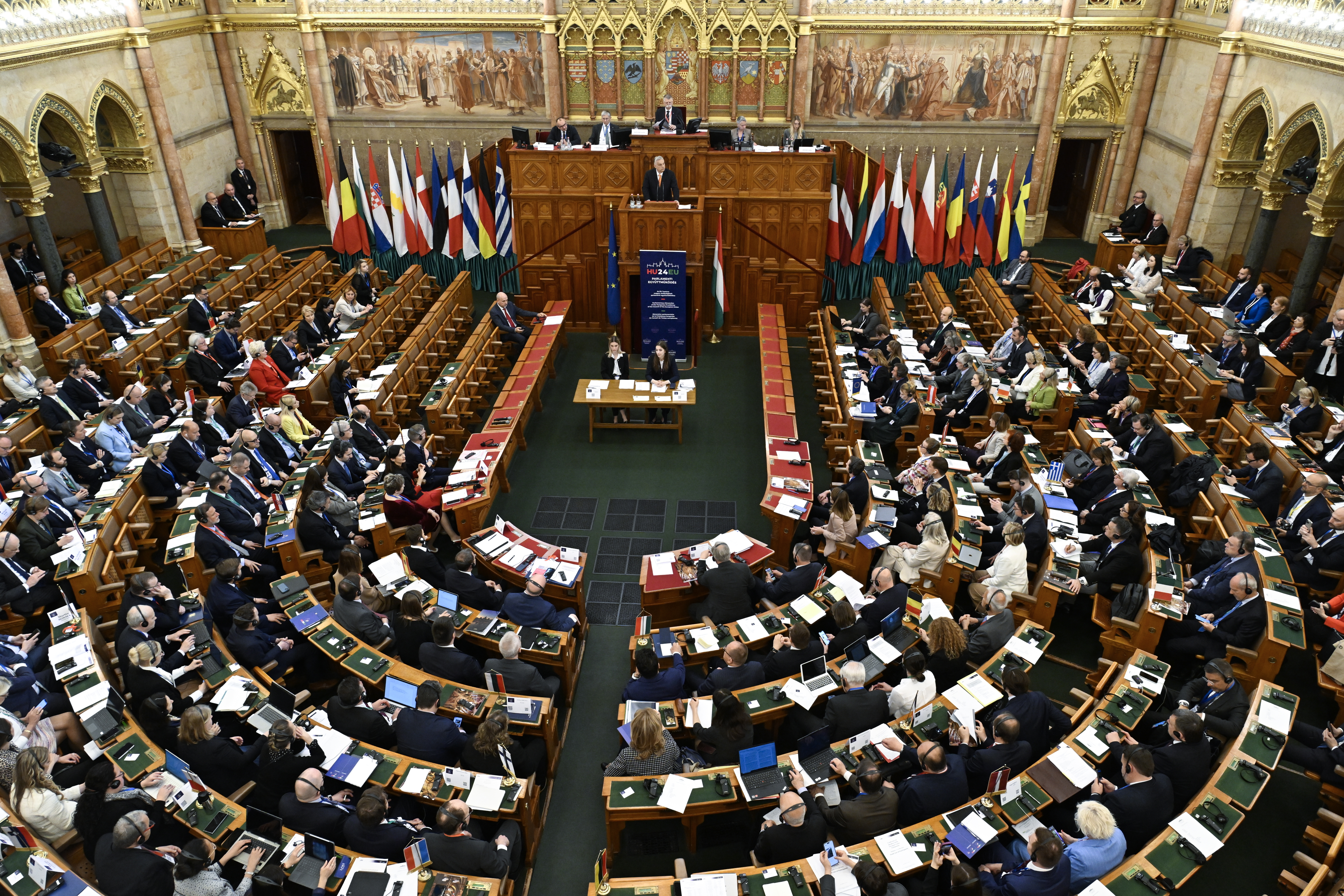
In addition to further supporting Ukraine, the EU wants to ban Russian fossil fuel imports.Continue reading

As a country neighboring Ukraine, we believe that if Ukraine is admitted to the European Union, it will mean war, the Prime Minister emphasized on Monday at a conference of EU parliamentary presidents held at the Parliament Building.
At the closing conference of parliamentary events related to last year’s Hungarian EU Presidency, Viktor Orbán pointed out that several European nations want to provide further support to Ukraine so that it can continue the war. However, Hungary has a different opinion on this, he said, adding that the government believes that the longer the war lasts, the more lives will be lost and the worse the situation on the battlefield will become.
He emphasized that the European Commission’s proposal to make it mandatory to disconnect from Russian energy sources because of the war would simply kill the Hungarian economy.
Imagine that the price of energy for households and businesses suddenly doubles. Hungarian families would not be able to cope,”
he said.
He recalled that the EU has never accepted a country at war, and for good reason. Moreover, Ukraine’s membership would place an economic burden on mMember States that they would not be able to bear. He also pointed out that the EU’s accession of Central European countries had also benefited the older Member States. However, the situation with Ukraine is different, and we would be worse off, he said, citing agricultural crisis, unemployment, indebtedness, and a decline in living standards as risks.

Photo: MTI/Koszticsák Szilárd
The Prime Minister also highlighted that
the world is currently undergoing a transformation on a scale comparable only to the birth of modern nation states and the Peace of Westphalia.
The world is changing, the Western way of thinking is changing, and we Europeans must respond to this, he stressed. He asked conference participants to continue the dialogue on two strategic issues—the protection of national sovereignty and Ukraine’s accession to the EU—because these issues will determine the fate of EU Member States for decades to come and define the role of national parliaments.
He pointed out that the program of progressive liberalism had failed in the United States, replaced by a patriotic policy that will have serious international consequences. Meanwhile, he continued, China is advancing at a rapid pace and is now competing not only in terms of industrial capacity but also in terms of technological standards. Furthermore, India is also preparing to enter the world political arena, with all the attributes of the world’s most populous country to become a global power center comparable to China, he added.
At the same time, Europe is unprepared, Mr. Orbán underlined.
It is as if we want to solve the problems of the next decade with the answers of the previous decade, but the old truths no longer work, the world has changed and we Europeans have not followed,”
he said. The Prime Minister pointed out that he has been a member of the European Council for 15 years and has personally experienced the wasted years and the drift of the past period.
@PM_ViktorOrban: Europe is rich but weak, and this is the most dangerous combination
️ In his address at the Conference of Presidents of the European Union Parliaments, held today in Budapest, Prime Minister Viktor Orbán issued a stark warning: Europe stands at a… pic.twitter.com/SOZ3MADpnB
— Zoltan Kovacs (@zoltanspox) May 12, 2025
He also stated that the Western strategy to break Russia has failed. “No one dares to admit it, but we have lost this war,” he added, pointing out that Russia’s economy has not collapsed, the sanctions have not achieved their goal, and the Russians have prevented Ukraine from joining NATO. He indicated that the Americans have recognized this and are now negotiating, while “we Europeans” are continuing the war and pretending that we can win.
He assessed that Europe had abandoned its economic strategy based on cheap Russian energy, and above all, advanced German technology, but had no new strategy. “We are standing in the middle of nowhere,” he said. He emphasized that American and Chinese companies now get energy at a third or a quarter of the price of European companies because cheap energy has disappeared from Europe due to sanctions.
Sanctions and the Green Deal are together destroying the European economy,” he stated.
The European economy is not competing, but retreating, he said, adding that only four of the world’s 50 largest technology companies are European today. The gap between European and American GDP has doubled in the last twenty years in favor of the Americans; real per capita income has grown twice as fast in the United States as in the EU since 2000, he continued.
A new strategy and strong European leaders are needed, Viktor Orbán emphasized. He said that Europe today is rich and weak, which is the most dangerous combination, and that the continent must therefore be strengthened. After the Peace of Westphalia, Europe became strong and a world power with the creation of nation states, and the European Union has also become successful through cooperation between nation states and strong leaders of strong national democracies, he added. He stressed that
there are no strong and successful nation states in Europe without strong national parliaments, and that the EU owes everything to national parliaments.
He explained that national parliaments are the historical arenas and laboratories for the development of European constitutionalism and democracy. The common European values that are so often referred to in Brussels were in fact born in the chambers and corridors of national parliaments, he said.
If the EU wants to be successful, it must show more respect for national parliaments, which are not artificial institutions created by treaty, but genuine representative bodies that have developed organically,
he added.
The Prime Minister said that for 15 years, whenever Europe has faced a problem, Brussels’ response has always been the same: more power for Brussels, less room for maneuver for nation states. The result is that the problems have never diminished, but have always worsened, he pointed out, citing the financial crisis, migration, the energy crisis, and war as examples.
Mr. Orbán said that those who resist centralization and the creeping withdrawal of powers, and who defend the framework of the nation state, are threatened with the withdrawal of EU funds. If that does not work, Brussels will make national governments unworkable, interfere and overthrow them, and help “agent parties” that are willing to give up national sovereignty to come to power, he said. They tried this in Hungary in 2018 and 2022, without success, and now they are trying for the third time, he noted.
He also pointed out that the “Brussels NGO scandal” is growing, referring to the findings that the Brussels bureaucracy has given hundreds of millions of euros in public money to organizations that are advocates and lobbyists for a federal Europe. This can only be described as “an attempted coup against national parliaments,” he stated.
He drew attention to the resolution adopted by the Hungarian National Assembly on the future of the EU, which proposes that the principle of ever closer union be removed from the treaties, that Europe’s Christian roots and culture be enshrined in the treaties, that the European Commission be politically and ideologically neutral, and to strengthen the principle of subsidiarity.
If we really want to build a strong Europe, then national parliaments must play a leading role, not a secondary one,
he emphasized. We, as members of national parliaments, have a duty to assume our role, and we Hungarians are ready to do so. Make Europe Great Again, Orbán concluded his speech.
Via MTI, Featured photo via MTI/Koszticsák Szilárd